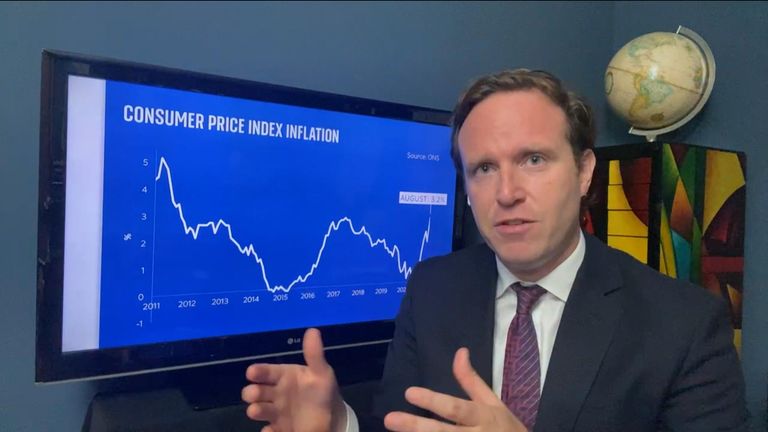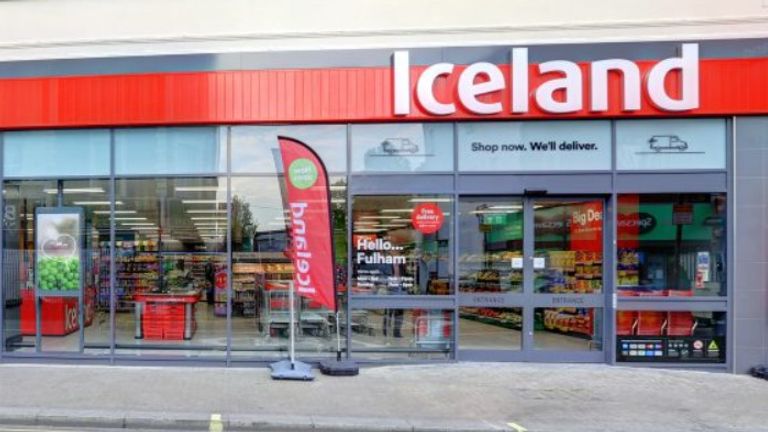Bank of England ramps up inflation forecast again but takes no action to help cool prices
The Bank of England has again ramped up its warnings about rising prices and admitted the economy is not growing as fast as it had expected.
However, it stopped short of taking action in a bid to help cool costs as its monetary policy committee (MPC) kept interest rates on hold and maintained the Bank’s £895bn bond-buying support for the post-COVID economic recovery.
The Bank said its staff now expected growth during the current third quarter to come in 1% weaker than estimated just last month amid the deteriorating price boom.
The challenges include extra costs associated with a shortage of workers, global supply chain delays and surging energy prices including the record rise in wholesale gas costs.
The latter is set to bite household finances in the months to come at a time when government COVID aid, including furlough cash and the Universal Credit uplift, will have been withdrawn.
The Bank has consistently pointed to a central view that the energy spike this year – the main cause of the price problem – would be “transitory”.
It has blamed the bill pressures on the consequences of the economy reopening and seen the effects as temporary despite concerns raised by its-then chief economist Andy Haldane.
The MPC then warned in August that a “modest tightening” of policy may be required to help cool prices as it predicted the consumer prices index (CPI) measure of inflation hitting a 10-year high of 4%.
It is currently at 3.2% following the largest leap on record.
The Bank said on Thursday that it now expected CPI to exceed 4% by the year’s end.
The split on the MPC around tapering support grew as a second member, deputy governor Dave Ramsden, joined Michael Saunders in voting for an early end to government bond purchases.
A summary of the meeting read: “Since the August MPC meeting, the pace of recovery of global activity has showed signs of slowing.
“Against a backdrop of robust goods demand and continuing supply constraints, global inflationary pressures have remained strong and there are some signs that cost pressures may prove more persistent.”
It added: “The material rise in spot and forward wholesale gas prices since the August Report represents an upside risk to the MPC’s inflation projection from April 2022.
“Most other indicators of cost pressures have remained elevated. The Committee’s central expectation continues to be that current elevated global cost pressures will prove transitory.”
The Bank also said it would be watching carefully the impact of the furlough scheme’s demise at the end of the month.
It delivered its verdict hours after a snapshot of private business activity pointed to stagnating economic growth and an acceleration in the pace of price increases – a scenario known as “stagflation”.
The IHS Markit/CIPS flash purchasing managers’ index survey showed confidence at its weakest since January.
Chris Williamson, IHS Markit’s chief business economist, said of the findings: “While there are clear signs that demand is cooling since peaking in the second quarter, the survey also points to business activity being increasingly constrained by shortages of materials and labour, most notably in the manufacturing sector but also in some services firms.
“A lack of staff and components were especially widely cited as causing falls in output within the food, drink and vehicle manufacturing sectors.
“Shortages are meanwhile driving up prices at unprecedented rates as firms pass on higher supplier charges and increases in staff pay.”
Commenting on the Bank of England meeting, chief UK economist at Pantheon Macroeconomics Samuel Tombs, said: “The MPC is waiting until November to provide a clearer steer on the outlook for interest rates, as by then it will be able to make an initial assessment of the wind-down of the furlough scheme and review the latest fiscal plans in the October 27 Budget.”





